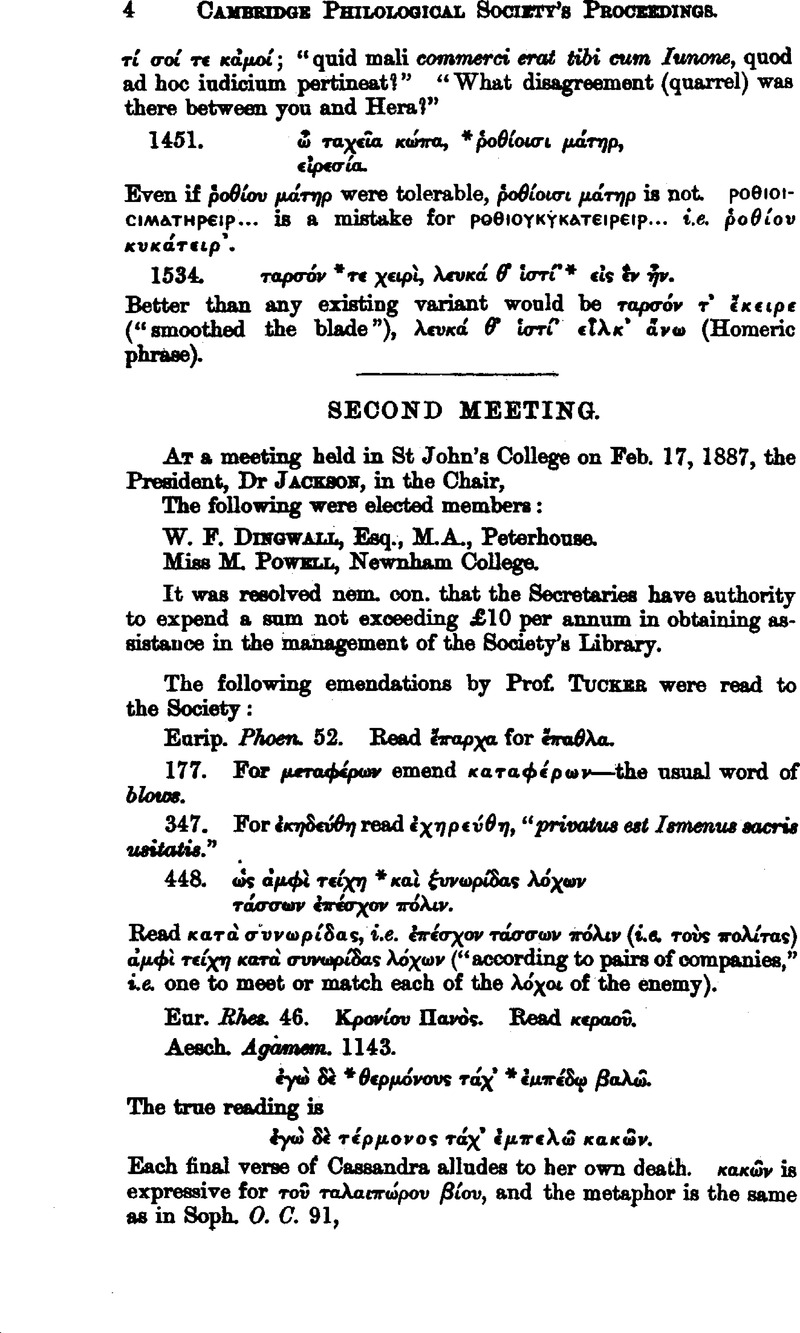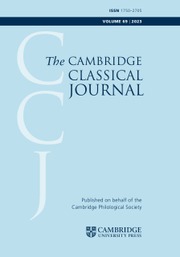No CrossRef data available.
Article contents
Second Meeting
Published online by Cambridge University Press: 02 April 2015
Abstract

Information
- Type
- Lent Term, 1887
- Information
- Copyright
- Copyright © The Author(s). Published online by Cambridge University Press 1887
References
page 6 note 1 Or, which comes to the same thing: ‘þeim er til verþar, &c., goþs vm oþis, ef ser geta mȩtti, &c.’ i.e. ‘if he might obtain such things for himself’ (‘geta’ consequently without an object), and also ‘orþz’, &c.
page 8 note 1 The Editor of the ‘Corpus’ somewhat sweepingly remarks:—‘Former editors have not even been aware of the fearfully corrupt state in which the text stands in R’ (cod. Reg.). ‘They have busied themselves with disputes about stanzas in unstanzaic poems, and endeavoured with all manner of grammar-defying devices to squeeze sense out of the senseless corruptions of a mangled text; or they have vexed their souls over questions of spelling, whilst they left the sense smothered and choking without lifting a finger to rescne it.’ Cor. Poet., I, CXVIII. There is some grain of truth in this. With this estimate in his mind of cod. Reg. the Editor, however, has treated the MS. with almost incredible lenience; and the present is a very telling instance of sense being squeezed out by ‘grammar-defying devices’.
page 8 note 2 Cfr. ‘af þessu fjekk hrútr gott orð’ Njála (1875) 8, 61–62 Google Scholar.
page 8 note 3
Both dictionaries take ‘þ![]() go’ also from ‘þaga’, ‘silentium’, Lex. Poet. 137, but ‘acceptio’ Lex. Poet. 904; ‘þaga, u, f. silence; in endr-þaga, silence in return’, Cleasby 729, b. But ‘þaga’ is an unknown word, and on that account alone, though as correctly formed from ‘þegja’ as ‘saga’ is from ‘segja’, inadmissible; besides, what possible sense could there be in ‘silence in return’?
go’ also from ‘þaga’, ‘silentium’, Lex. Poet. 137, but ‘acceptio’ Lex. Poet. 904; ‘þaga, u, f. silence; in endr-þaga, silence in return’, Cleasby 729, b. But ‘þaga’ is an unknown word, and on that account alone, though as correctly formed from ‘þegja’ as ‘saga’ is from ‘segja’, inadmissible; besides, what possible sense could there be in ‘silence in return’?
page 10 note 1
In a letter of Nov. 28th, 1884, in answer to my proposal to alter the strophe and to interpret it as above, he writes:—“I agree entirely with your conjecture. ‘Orð góðs œðis’ gives excellent sense. I also agree with you in taking ‘endrþ![]() rgo’ as acc., and in the sense you attribute to it.—This your text-alteration and interpretation I regard as incontestable.”
rgo’ as acc., and in the sense you attribute to it.—This your text-alteration and interpretation I regard as incontestable.”
page 11 note 1 Müllenhoff (l.c.) finds that these strophes ‘passen nicht recht in den zusammenhang’, that is to say, where-they stand in Cod. Reg. But that the eighth should be a later addition is, in my opinion, out of question.
page 12 note 1 A scribe, familiar with ‘Grimnismál,’ where ‘heitir’ so frequently disturbs the first line in ‘Ljóðaháttr,’ but where its presence is required by the context, at least in the majority of the cases where it occurs, might have introduced it here in imitation of an admired pattern.
page 12 note 2 In addition to the references there given may be adduced Egilssaga (Ed. 1856, 39, 4) ‘þeir Hallvarðr héldu á )því máli’ = ‘would persist in harping on the matter’.
page 13 note 1 In Hamðismál, str. 26 (Bugge), we have the same proverb, in a different form, expressed in the following circumstances: King Ermanaric had brutally caused his queen Swanhild, the daughter of ‘Guðrún Gjúkadóttir’ to be put to death. The enraged mother urged her sons to avenge the deed, and of these Sórli and Hamðir gave such a good account of themselves in Ermanaric's hall, that Hamðir exultingly ventured to taunt Ermanaric with his cut-off hands and feet being thrown into the fire. Ermanaric then called on his people to change a fight with ordinary weapons to one of stone-throwing, in which two men, provided with no such missiles, against many would be placed at every disadvantage. Then Sörli probably, as Bugge suggests, not Hamðir as Cod. Reg. has it, upbraids his brother in these terms (apparently for his provoking language to Ermanaric, but possibly rather for some other unwise word, the record of which is lost):—
B![]() l vantv, broþir,
l vantv, broþir,
er þu þann belg leystir,
opt or þeim belg
b![]() ll raþ coma.
ll raþ coma.
i.e. Bale thou wrought'st, brother,
that bag undoing,
oft out of that bag
dire counsels come.
The words in italics deprive this passus of sense. We cannot with any certainty tell to whom ‘that bag’ could refer, or who it could be, from whom ‘often dire counsels come’, though the vague impression on the mind is, that it may refer to Ermanaric. The ‘Editor’ of the ‘Corpus’, realizing this, solves the difficulty in his own way by simply inserting ‘sc![]() rpum’ from ‘Hávamál’ for ‘þeim’, whereupon he translates the words:—‘opt… coma’ by: ‘Sharp counsels often come out of a shrivelled belly’!—Here a conjectural reading must, of necessity, be resorted to. In ‘or þeim’ I see, even on palæographical grounds, the syncopated dative ‘orþgum’, from ‘orþigr, i.e. orðigr= wordy, rash-spoken. ‘Opt orþgum belg b
rpum’ from ‘Hávamál’ for ‘þeim’, whereupon he translates the words:—‘opt… coma’ by: ‘Sharp counsels often come out of a shrivelled belly’!—Here a conjectural reading must, of necessity, be resorted to. In ‘or þeim’ I see, even on palæographical grounds, the syncopated dative ‘orþgum’, from ‘orþigr, i.e. orðigr= wordy, rash-spoken. ‘Opt orþgum belg b![]() ll raþ coma’= ‘oft to a rash mouth comes dire retribution’, expresses a sentiment almost identical with Háv. 29, ‘hraðmȩlt tunga opt ser ogott vm gelr’ = ‘a fast tongue often chants its own trouble’. That this Hamðismál proverb is a later outgrowth of the one in Hávamál seems obvious, though that fact need not necessarily affect the question of the relative age of the two poems.—It is curious to see, how ideas from the two proverbs have blended together in the naughty Icel. legend of ‘þorsteinn karlsson’ (Isl. þjóðsögur’, II, 479) where a ‘gray neat's skin’, hanging over the King's throne. (!) is called ‘orðorðabelgr’ = wordbag. Did the location of ‘belgr’ at this particular spot take place because the Icelandic story-tellers understood ‘vilmegir’ as lordly persons or favourites of such, = ‘vildarmenn’?
ll raþ coma’= ‘oft to a rash mouth comes dire retribution’, expresses a sentiment almost identical with Háv. 29, ‘hraðmȩlt tunga opt ser ogott vm gelr’ = ‘a fast tongue often chants its own trouble’. That this Hamðismál proverb is a later outgrowth of the one in Hávamál seems obvious, though that fact need not necessarily affect the question of the relative age of the two poems.—It is curious to see, how ideas from the two proverbs have blended together in the naughty Icel. legend of ‘þorsteinn karlsson’ (Isl. þjóðsögur’, II, 479) where a ‘gray neat's skin’, hanging over the King's throne. (!) is called ‘orðorðabelgr’ = wordbag. Did the location of ‘belgr’ at this particular spot take place because the Icelandic story-tellers understood ‘vilmegir’ as lordly persons or favourites of such, = ‘vildarmenn’?
page 15 note 1 All these interpretations derive their origin from the fact, that Snorra Edda (I, 532, cfr. II. 610) includes ‘vílmegir’ among the synonyms for ‘a craven’, ‘a coward’,
page 16 note 1 In order to make sure of the matter, I wrote to friends in the East of Iceland some time after I read this paper, inquiring whether the word was still in use; for already in my youth the word ‘hleypir’ (identically the same word as ‘rennet’ = that which causes the milk to ‘leap’, to ‘run’ together) was quite as common as ‘vil’, while a third term for the same thing, ‘kæsir’ ( = ‘cheeser’, cheese maker) was mostly heard in humorous rustic poetry.— In a letter, d. 3/4 – 87, the Rev. Sigurðr Gunnarsson of Vaiþjófsstaðr states that the word is still well known in those parts, and sends me a variation of the legend about the ‘Trollwoman of Mjóifjord’(‘Mjóafjarðar skessan’ Iselenzkar þjóðsögur, I, 152) in which the much quoted ditty ‘Takið úr mjer’ &c., instead of ‘vilin og svilin’, has the notable variation: ‘ilið og vilið’ and thus affords independent evidence of ‘vil’ being used, even in the sense of bowels, in the singular. Not that in that sense the word is so used in the modern language; but being employed in the singular in its technical sense of ‘rennet’, the framer of the ditty resorted to the poetical licence of putting it in the singular, too, to express ‘bowels’ in order to have a perfect rhyme to ‘gilið’.

